In the first month of the Fellowship, I interviewed 21 Self Help Groups (SHG's) from Bishnupur district in Manipur. The SHG's were funded through YVU Microfin, a field partner of Milaap which provides microfinance to rural women for Enterprise Development. All the women had used the funds judiciously and were working for better lives. Within these groups however, there were some inspiring individuals who stand out and I would like to share their stories here. These women embody hope, change, and resilience - remarkable qualities I saw first hand on my field visits
My companion, as well as the translator on these field visits was Kii Ran, manager of YVU's Nambol branch. As the pillion on his Pulsar through the dirt roads of villages of Bishnupur, I had plenty of time to talk to him. We talked about the borrowers, microfinance, the upcoming polls in Manipur and also the ongoing economic blockade. He had spent the whole previous night in a queue for petrol (a scarce commodity in Manipur currently) at a petrol pump! This so he could take me on my field visits. "Just doing my job," he said.
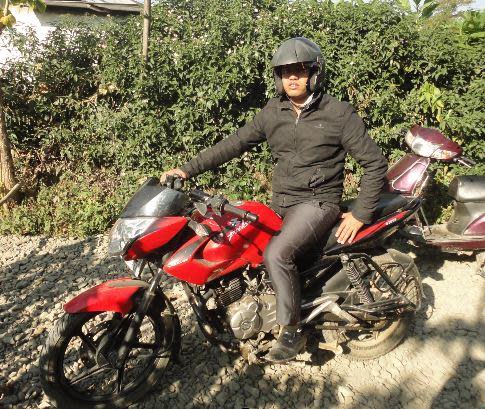 Kii Ran on his Pulsar
Kii Ran on his PulsarThere are about 260 SHG's under Nambol branch and he remembers the address and directions to each of them!
Ibemcha Devi Arambam - "I have opened an account at the post office and put Rs 300 in it every month for my son's future"
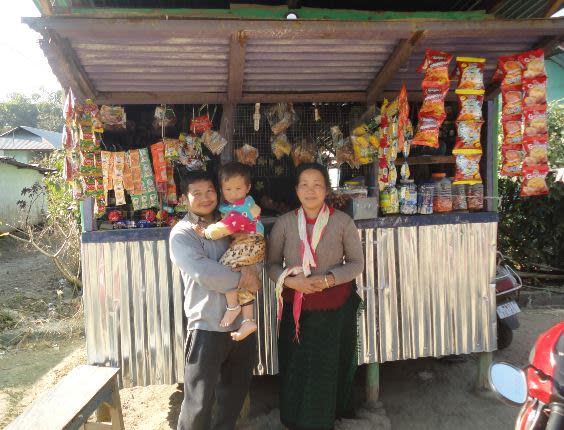 Ibemcha with her husband and son Chingleim in front of their shop
Ibemcha with her husband and son Chingleim in front of their shopWhen we reached her house, Ibemcha was busy opening her shop for the day. I struck up a conversation with her husband and was surprised to find that he was fluent in English as well as Hindi, languages rarely spoken in these parts. He said he had picked them up when he worked at Pizza Hut in Indiranagar, Bangalore in 2014 before moving back to the village. Kii Ran added that he too had worked at Meenakshi Mall in Bangalore before coming back to Manipur. This was the time that I lived in Bangalore and frequented these places often. To think, all three of us might have crossed paths before!
Ibemcha joined us soon and we got talking. She had used the funds from YVU to buy the goods (on a rolling basis) she sold at her shop. The shop also provided first-aid medicines, a fact that she mentioned with a pride. Because the shop was in a remote location, sales were less. The economic blockade did not help either. She saved about Rs 500-700 per month. Despite the modest savings, she had opened an account at the local post office and was putting Rs 300 in it every month. One day, it would be used to fund the education of her son, Chingleim. This woman was taking care of her family's present and future needs.
I bought a packet of potato chips from their shop. When I tried to pay her for it, she refused. I insisted, but she said that there was no way they could accept money from me. Despite the lack of money, what this family had was a big heart filled with hopes of a better future for their son. Some financial support might just do the trick for Chingleim.
Memcha Khangembam-"My eyesight is bad and weaving needs good vision. So instead of weaving, I started a poultry farm"
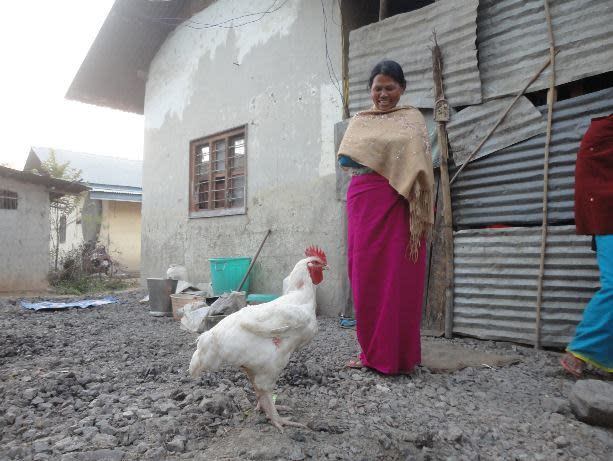 Memcha with the "enthusiastic" hen from her poultry farm
Memcha with the "enthusiastic" hen from her poultry farmMemcha Khangembam is a 42-year-old married woman. She has two children (a boy and a girl), and both go to school. In rural Manipur, a girl's eligibility for marriage is judged by her weaving skill. To me, this explained how the women of Manipur produced the beautiful clothes that I saw during my field visits. Like most of the women from Manipur, Memcha too is well versed in the craft. She was a weaver for some time.
But the threads used for weaving are expensive and out of reach for most of the women. To buy them, they have to borrow from the local moneylenders, at an exorbitant interest rate. So they turn to microfinance institutions (MFI's) like YVU for the funds to buy threads. They weave clothes on handloom machines (mostly at their homes) and sell it in the market. Using their earnings, they repay these MFI's in small installments. Memcha also took a loan to buy threads and used to weave phanek and phee (traditional Manipuri attire for women). She ran the business smoothly till she started having problems with her vision.
Weaving requires intensive use of eyesight. The intricate patterns that go into a phanek or a phee require close attention to the details of weaving. Her deteriorating vision could not keep up. But instead of being disheartened, she decided to start afresh. She bought 15 hens and set up a poultry farm in her house. She sells their eggs in her locality. Though the income is not what it used to be, she is able to educate her 2 children, pay for household expenses and repay the loan. In future, she also hopes to expand the poultry farm.
Her 'farm' is the backyard of her house. She keeps a wooden crate with several hens inside. One particular hen, would just not stay in and kept escaping the crate.
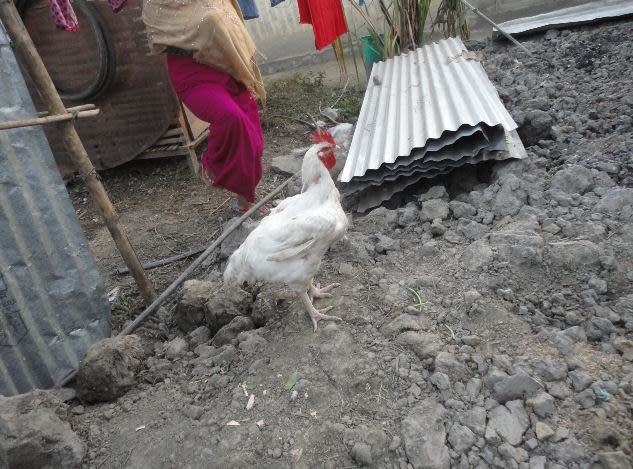
This 'enthusiastic hen' seems to be Memcha's favourite. Memcha chased and tackled it, eventually putting it pack inside the crate.

Seeing Memcha at work is inspiring. She will not let anything affect the lives of her family. She symbolizes the spirit of change, determination and taking control of one's future in own hands.
Mema Puyam- "My only dream is to see my son reach his true potential as an athlete"
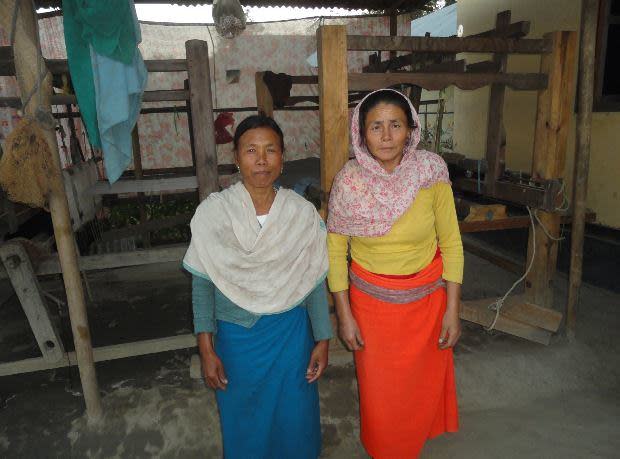
Mema Puyam (left) with Memton
It was late by the time I reached Mema Puyam's home. Mema was waiting for us with Memton, another borrower. Both had used the funds for buying the expensive muga (silk) threads from which they weave muga phee, a type of shawl. A kilogram of these threads cost about Rs 4,000-5000. They needed a loan to purchase these threads to make the expensive Muga shawl. Mema's business was running smoothly. When I asked her about her future plans, she told that her only plan was to see her son Ashok reach his full potential as an athlete.
Her 18-year-old son Ashok Kumar was a runner and had twice represented Manipur in national tournaments. She wants to invest all her income in grooming her son's future as a sportsperson. Even in cities, I had never before met a parent so dedicated to help their child become a sportsperson. Listening to a mother speak passionately about her child's dream of pursuing a career in sports in one of the remotest parts of the country was totally new to me. As Haritha, a dear friend and a co-fellow wrote in her blog recently "What seems impossible to you, is what someone else is going through right in front of your eyes..."
There was a lot to think on my way back to Thoubal. Would it be possible for Chingleim or Ashok to study or play sports without people like Ibemcha and Mema? Ibemcha and Mema have, perhaps enough hope and courage to help their children fulfill their potential. But they need something more. This is where microfinance can help.
Muhammad Yunus, the Nobel laureate who opened the doors of microfinance to thousands through his Grameen Bank initiative in Bangladesh in his book 'Creating a World without Poverty' has written that "Poor people are bonsai people. There is nothing wrong with their seeds. Only society never gave them a base to grow on". Microfinance can provide Chingleim and Ashok a chance to grow and attain their full potential, a chance that they definitely deserve. That chance is what makes all the difference.








